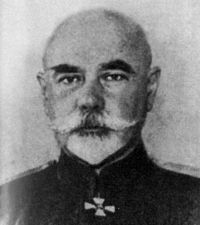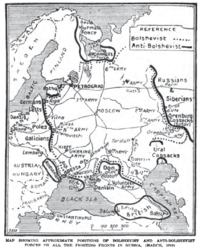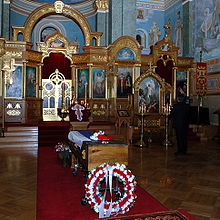Anton Denikin - Picture
More about World War 1

|
|
Anton Ivanovich Denikin

Born: December 16, 1872(1872-12-16)
Włocławek, Warsaw Governorate, Privislinsky Krai
Died: August 8, 1947(1947-08-08) (aged 74)
Ann Arbor, Michigan
Spouse: Xenia Vasilievna Chizh
Children: Marina Denikina
Anton Ivanovich Denikin (December 16, 1872 - August 8, 1947) was Lieutenant General of the Imperial Russian Army (1916) and one of the foremost generals of the White movement in the Russian Civil War.
Childhood
Denikin was born in Szpetal Dolny village, now a part of the Polish city Włocławek (then part of the Russian Empire). His father, Ivan Efimovich Denikin, had been born a serf in the province of Saratov. Sent as a recruit to do 25 years of military service, Ivan Denikin became an officer on the 22nd year of his army service, in 1856. He retired from the army in 1869 with the rank of a major. In 1869 Ivan Denikin married a poor Polish seamstress, Elżbieta Wrzesińska - his second wife. Anton Denikin, the couple's only child, learned to speak two languages (Russian and Polish) at the same time. His father's commitment to Russian patriotism and the Orthodox religion was crucial for Anton Denikin's decision to become a soldier.
The Denikins lived very close to poverty, the retired major's small pension being their only source of income. After his father's death in 1885, Denikin's family financial situation got even worse. Anton Denikin began tutoring younger schoolmates so that the family could earn an additional income. In 1890 Denikin began a course at the Kiev Junker School, a military college from which he graduated in 1892. Twenty-year-old Denikin joined an artillery brigade, in which he served for three years.
In 1895 he was first accepted into General Staff Academy, where he did not meet the academic requirements in the first of two years. After the disappointment, Denikin attempted to attain acceptance again. On his next attempt he did better and ended up fourteenth in his class. However, to his misfortune, the Academy decided to introduce a new system of calculating grades and as a result Denikin was not offered a staff appointment after the final exams. Denikin protested the decision to the highest authority (The Grand Duke), and after being offered a settlement which he would rescind his complaint in order to attain acceptance into General Staff school again, Denikin declined, feeling insulted at the lack of integrity presented by the offer.
Denikin first saw active service during the 1905 Russo-Japanese War. In 1905 he was promoted to the rank of colonel. In 1910 he was appointed commander of the 17th infantry regiment. A few weeks before the outbreak of the First World War, Denikin reached the rank of major-general.
World War I
By the outbreak of World War I in August 1914 Denikin was a Chief of staff of the Kiev Military District. He was initially appointed Quartermaster of General Brusilov's 8th Army. Not one for staff service, Denikin petitioned for an appointment to a fighting front. He was transferred to the 4th Rifle Brigade. His brigade was transformed into a division in 1915. It was with this brigade Denikin would accomplish his greatest feats as a General.
In 1916 he was appointed to command the Russian VIII Corps and lead troops in Romania during the last successful Russian campaign of the war, the Brusilov Offensive. Following the February Revolution and the overthrow of Tsar Nicholas II, he became Chief of Staff to Mikhail Alekseev, then Aleksei Brusilov, and finally Lavr Kornilov. Denikin supported the attempted coup of his commander, the Kornilov Affair, in September 1917 and was arrested and imprisoned with him. After this Alekseev would be reappointed commander-in-Chief.
Civil War
Following the October Revolution both Denikin and Kornilov escaped to Novocherkassk in southern Russia and, with other Tsarist officers, formed the anti-Bolshevik Volunteer Army, initially commanded by Alekseev. Kornilov was killed in April 1918 near Ekaterinodar and the Volunteer Army came under Denikin's command. There was some sentiment to place Grand Duke Nicholas in overall command, but Denikin was not interested in sharing power. In the face of a Communist counter-offensive he withdrew his forces back towards the Don area in what was known as the Ice March. Denikin led one final assault of the southern White forces in their final push to capture Moscow in the summer of 1919. For a time, it appeared that the White Army would succeed in its drive; Leon Trotsky, as commander of Red Army forces hastily concluded an agreement with Nestor Makhno's anarchist Revolutionary Insurrectionary Army of Ukraine or 'Black Army' for mutual support. Makhno duly turned his Black Army east and led his troops against Denikin's extended lines of supply, forcing him to retreat. Denikin's army was decisively defeated at Orel in October 1919, some 400 km south of Moscow. The White forces in southern Russia would be in constant retreat thereafter, eventually reaching the Crimea in March 1920. The Soviet government immediately tore up its agreement with Makhno and attacked his anarchist forces. After a seesaw series of battles in which one side or the other gained a victory, Trotsky's Red Army troops, more numerous and better equipped, defeated and dispersed Makhno's Black Army.
In the occupied territories, Denikin's regime carried out mass executions and plunder, in what was later known as the White Terror. In the town of Maikop in southern Russia during September 1918, more than 4000 people were massacred by General Pokvrovsky's forces. Denikin's Counterintelligence was characterized by rampant arbitrariness. Prisons were crowded with detains and Volunteer Army soldiers plundered the occupied towns.

Picture - General Anton Denikin's Volunteer Army and regional Armed forces after Armistice of Mudros
Denikin's regime on 24 November 1919 passed a law that determined the internal policy after the expected White victory in the Civil War. Under this law, all those who were involved in activities of the Soviets, who carried out or facilitated its tasks, as well as those who participated "in the Communist Party, which established the power of the Soviets of Workers deputies, is subject to deprivation of all property rights and the death penalty. The death penalty was threatened on all members of the Communist Party numbering more than 300 thousand as well as workers who participated in the nationalization of factories, or contributed to it, or were members of trade unions, peasants who participated in the land reforms, and soldiers of the Red Army.
During the Russian Civil War, an estimated 100,000 Jews perished in pogroms perpetrated by Symon Petlyura's Ukrainian nationalist separatists and the White forces led by Anton Denikin. The press of the Denikin regime regularly incited violence against Jews. For example, a proclamation by one of Denikin's generals incited people to "arm themselves" in order to extirpate "the evil force which lives in the hearts of Jew-communists." In the small town of Fastov alone, Denikin's Volunteer Army murdered over 1500 Jews, mostly elderly, women, and children. An estimated 100,000 Jews were killed in pogroms perpetrated by Denikin's forces and other anti-soviet armies.
Facing increasingly sharp criticism and emotionally exhausted, Denikin resigned in April, 1920 in favor of General Baron Pyotr Wrangel. Denikin left the Crimea by ship to Constantinople and then to London. He spent a few months in England, then moved to Belgium, and later to Hungary.
Exile
From 1926 Denikin lived in France. Although he continued to remain bitterly opposed to Russia's Communist government, he chose to remain discreetly on the periphery of exile politics, spending most of his time writing and lecturing. This did not prevent the Soviets from unsuccessfully targeting him for abduction in the same effort that snared exile General Alexander P. Kutepov in 1930 and later General Evgenii K. Miller in 1937. White Against Red - The Life of General Anton Denikin gives possibly the definitive account of the intrigues during these early Soviet "wet-ops".
Denikin was a talented writer, and before World War I had written several pieces in which he analytically criticized the shortcomings of his beloved Russian Army. His voluminous writings after the Russian Civil War (written while living in exile) are remarkable for their analytical tone and candor. Since he enjoyed writing and most of his income was derived from it, Denikin started to consider himself a writer and developed close friendships with several Russian émigré authors-among them Ivan Bunin (a Nobel Laureate), Ivan Shmelev, and Aleksandr Kuprin.
Although respected by most of the community of Russian exiles, Denikin was disliked by émigrés of both political extremes, the right and the left.
With the fall of France in 1940, Denikin left Paris in order to avoid imprisonment by the Germans. Although he was eventually captured, he declined all attempts to co-opt him for use in Nazi anti-Soviet propaganda. The Germans did not press the matter and Denikin was allowed to remain in rural exile. Although not formally part of the resistance, his activities would certainly have been sufficient to cause his arrest had they been fully known to the Nazi authorities. Diary entries kept by his wife during this period also make it clear that he was appalled by Nazi anti-Semitism, a fact that may shed light on his actual attitude toward the pogroms of the Russian Civil War.

Picture - Denikin's coffin in St. Nicholas Russian Orthodox Cathedral, New-York.
At the conclusion of the war, correctly anticipating their likely fate at the hands of Joseph Stalin's Soviet Union, Denikin attempted to persuade the Western Allies not to forcibly repatriate Soviet POWs (see also Operation Keelhaul). He was largely unsuccessful in his effort.
From 1945 until his death in 1947, Denikin lived in the United States, in New York City. On August 8, 1947, at the age of 74, Denikin died of a heart attack while vacationing near Ann Arbor, Michigan.
General Denikin was buried with military honors in Detroit. His remains were later transferred to St. Vladimir's Cemetery in Jackson, New Jersey. His wife, Xenia Vasilievna Chizh, was buried at Saint Genevieve de Bois cemetery near Paris.
On October 3, 2005, in accordance with the wishes of his daughter Marina Denikina and by authority of President Vladimir Putin of Russia, General Denikin's remains were transferred from the United States and buried at the Donskoy Monastery in Moscow.
Honors
Golden Sword of St. George, decorated with diamonds, with the inscription "For the double release of Lutsk (22/09/1916)
Golden Sword of St George (11/10/1915)
Order of St. George, 3rd degree (11/03/1915)
Order of St. George, 4th degree (04/24/1915)
Order of St Vladimir, 3rd degree (04/18/1914)
Order of St Vladimir, 4th degree (12/06/1909)
Order of St. Anne, 2nd degree with Swords (1905)
Order of St. Stanislaus, 2nd degree with Swords (1904)
Order of St. Anne, 3rd degree with swords and bows (1904)
Order of St. Stanislaus, 3rd degree (1902)
Honorary Knight Commander of the Order of Bath, 1919 (UK)
Order of Michael the Brave, 3rd degree, 1917 (Romania)
Croix de Guerre, 1914-1918, 1917 (France)
Denikin's works
Denikin wrote several books, including:
Russian Turmoil. Memoirs: Military, Social & Political. Hutchinson. London. 1922.
Republished: Hyperion Press. 1973. ISBN 9780883551004
The White Army. Translated by Catherine Zvegintsov. Jonathan Cape, 1930.
Republished: Hyperion Press. 1973. ISBN 9780883551011.
Republished: Ian Faulkner Publishing. Cambridge. 1992. ISBN 9781857630107.
The Career of a Tsarist Officer: Memoirs, 1872-1916. Translated by Margaret Patoski. University of Minnesota Press. 1975.
More aircraft.
Source: WikiPedia